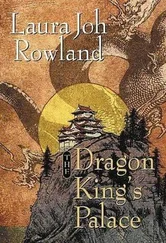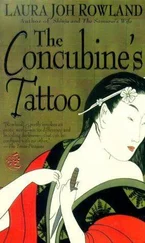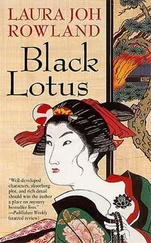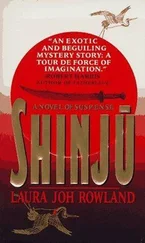Aoi had vanished, apparently for good.
After conveying Chūgo to Edo Jail, giving statements to the police and magistrate, and reporting the success of his investigation to the shogun, Sano had rushed to the Momijiyama to see Aoi- only to find another woman installed as chief shrine attendant and unable to tell him more than that Aoi had disappeared, leaving no explanation.
Frantic with grief and bewilderment, Sano had spent the past month searching for her, to no avail. Then, this evening, as he dressed for the banquet, he’d found the note hidden among his ceremonial robes.
My dearest,
Please forgive me for leaving without saying good-bye. I had no choice. With each passing year, my enslavement to the Tokugawa has grown harder to bear. When we met, my spirit had been dying little by little. It would have gone on dying, if not for you, who restored my hope, happiness, and desire to live.
But now Chamberlain Yanagisawa has ordered me to kill you. Rather than obey, I have fled, in the hope that I can join my family and escape with them before the troops come for us. Perhaps fate will spare your life and mine, even if we can’t spend them together.
I beg you not to pursue me, or tell anyone of our liaison. To reveal the full extent to which I’ve betrayed my master would only endanger me more.
Don’t be angry with me, or blame yourself for what is entirely my own decision. Instead, remember me as I will you:
With eternal love,
Aoi
The message closed with the crude sketch of a veiled female figure facing a mountain range. Sano, remembering their conversation the night of his beating, understood that Aoi had taken the perilous step of making her dream a reality. Disguised as a nun, living on roots and nuts and the alms of strangers, she was making her way toward Iga Province. Despite her attempt to absolve him of guilt, Sano knew he’d provided the final impetus for her action.
He’d saved lives by stopping Chūgo’s killing spree, but endangered the woman he loved by winning her affection and letting her forsake her duty. Guilt embittered Sano’s misery. Despite the ninja’s renowned ability to survive, he pictured Aoi hunted down, tortured, slain. And he could do nothing to prevent it. He couldn’t even thank her for her help, to which he owed much of his success, or for the gift of his life, which she’d purchased with her own.
Then Sano gasped in surprise. The characters of the note were fading. Written in magic ninja ink, they vanished, withdrawing from him as their writer had. Soon Sano held a blank sheet of paper.
As blank as his life was without Aoi.
Now, as the shogun praised his courage, Sano faced the hardest task of all: to stay at his post instead of following his heart and going after the woman he loved but couldn’t save. He wanted to dash from the room, mount his horse, and gallop wildly into the night, shouting Aoi’s name. He wanted to search every road, village, forest, and field between Edo and Iga Province until he found her. Yet her wishes and his own duty forbade him.
In his misery, Sano saw his life stripped of illusion. The castle was a luxurious prison. The shogun for whom he’d almost sacrificed his life, who now rambled drunkenly upon the dais, was merely the chamberlain’s puppet. Bushido was cruel; a place in history an empty reward. Heartbreak had shown him the truth of Dr. Ito’s words.
The shogun’s high, merry voice cut into Sano’s thoughts. “Ahh. Let us also rejoice in Sōsakan Sano’s engagement to Magistrate Ueda’s daughter.”
Except for Chamberlain Yanagisawa, who narrowed his eyes and compressed his lips, the assembly cheered. Sano woodenly exchanged nods with Magistrate Ueda. His change in fortune had induced the magistrate to bestow upon him Reiko’s hand. Sano valued the match that his father had desired for him, and an association with a man he respected. But he would gladly give it up for one brief moment with Aoi, to again know the exhilarating joy of ishin-denshin -their precious, unspoken soul-to-soul communication.
The shogun spoke about the match’s propriety and offered his blessings for its success. Then he said, “But enough of speeches.” He laughed and clapped his hands. The music resumed. “Come, ahh, let us enjoy ourselves!”
Sano accepted a sake decanter from a servant and reluctantly rose to perform the courtesy he’d been avoiding all night. Approaching Chamberlain Yanagisawa, he knelt, bowed, proffered the decanter, and said, “Honorable Chamberlain, please permit me.”
Ritual dictated that the chamberlain raise his cup and bow. This Yanagisawa did with characteristic elegance, but his expression was frigid, and as Sano poured the liquor, Yanagisawa’s hand trembled as though he longed to throw it in Sano’s face.
“I won’t forget, sōsakan ,” he said in a vicious murmur meant only for Sano’s ears. He downed the sake, grimacing as if the taste sickened him, then bowed to the shogun. “If you will excuse me,” he said, and swept from the room.
Sano knew the chamberlain would never forgive him for causing, albeit unintentionally, his terrifying abduction. Nor would he forget that because of Sano, the shogun had enjoyed a joke at his expense. Above all, Yanagisawa would never forgive him for witnessing his humiliation, or for rescuing him. These last had won Sano the powerful chamberlain’s permanent enmity. From now on, whatever he did, Yanagisawa would thwart him at every turn. With his spirit broken over Aoi’s departure, this prospect was more than Sano could stand. His position had lost its meaning for him and presented a challenge to which he no longer desired to rise.
The party dragged on and on. Sano’s face grew stiff from the strain of smiling; his throat ached with grief as he forced polite conversation and false laughter from his mouth. Not even drink could numb his emotions. He took some pleasure from seeing Hirata, with an air of suppressed rapture, fill the shogun’s cup.
Bringing happiness to someone he esteemed didn’t ease the howling anguish inside Sano. When dawn came, he could bear his pretense of enjoyment no longer. The shogun was snoring on the dais; the few guests not also asleep were engaged in drunken, senseless merriment. No one would miss Sano. He went home, got his horse, and rode out through the castle gate. Where was Aoi? To go to her now… Imagining the joy of seeing her again, he forgot the prohibitions that kept them apart.
A cry disturbed the summer morning’s humid hush: “ Sōsakan-sama !”
Sano turned and saw Hirata galloping down the promenade after him. His senses returned. He couldn’t leave his post, and he couldn’t endanger Aoi further. Grief drew cords of pain tighter around his chest; the emptiness within yawned wider and blacker.
“Are you all right?” Hirata asked, catching up. “Where are you going?”
Sano rode faster to get away from him. “I just need some fresh air,” he lied. “I’m going for a ride-alone.”
“I’ll go with you.” Hirata obviously sensed that something was wrong, although he couldn’t know what. Now he stuck by Sano, secure in his new status and concerned enough about his master’s welfare to disobey an order.
Too tired and dispirited to argue, Sano let him come. Together they rode north out of the city, where the murders had ended with Chūgo’s arrest, and the fire and riots in the accompanying storm. As they journeyed through the tranquil, awakening streets, Sano saw that the ravaged areas had already been rebuilt. The Bundori Killer might never have stalked the city.
In the Asakusa temple district, Sano dismounted outside a minor temple. “Wait here,” he told Hirata.
Entering the gate, he crossed the small precinct and passed through another gate leading to the cemetery, where the cherry trees were in full leaf now. A sprinkling of dry, brown fallen blossoms mingled with the gravel on the paths. The air was heavy with summer’s rich, fecund fragrance, but underneath it, Sano smelled autumn’s incipient decay. The sounds of temple bells, priests’ chants, and the clack of pilgrims’ wooden shoes seemed muted, distant: part of the living world that encompassed this memorial to death.
Читать дальше












